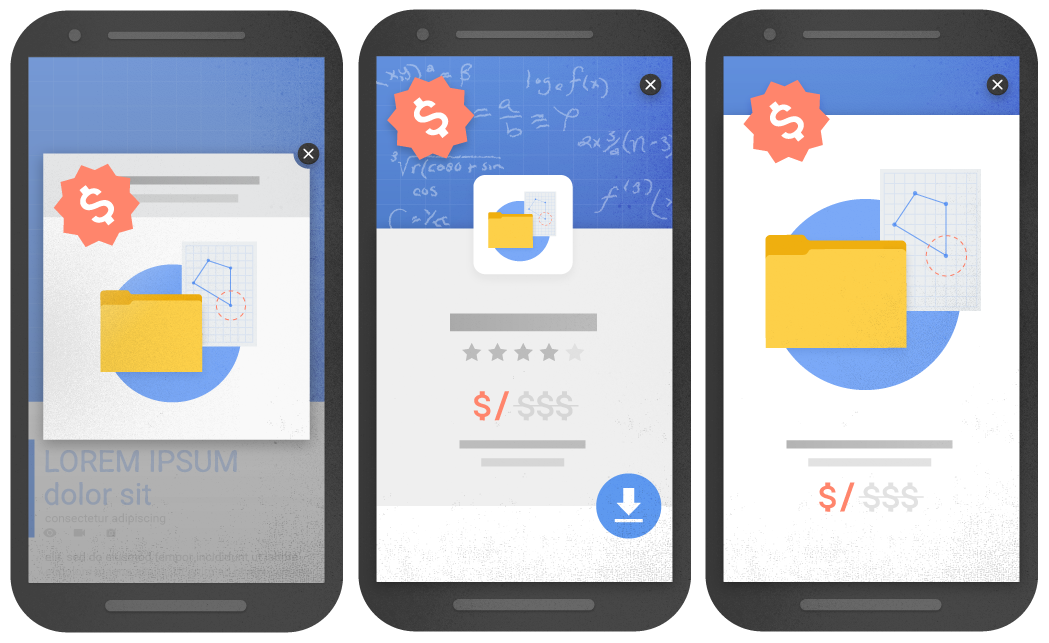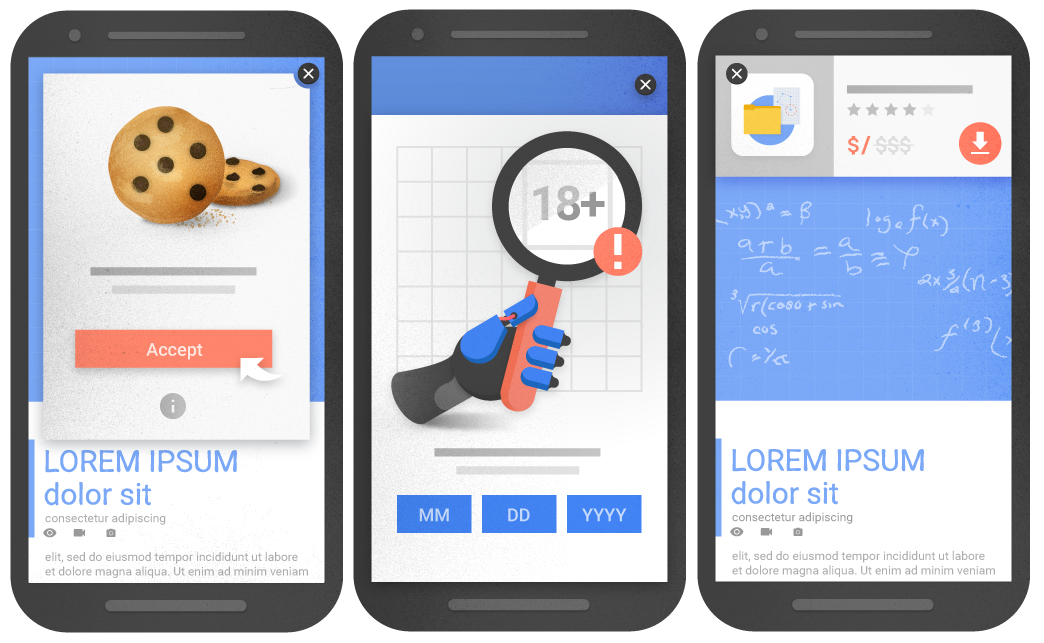Google lowered the issue of sites with full-screen mobile banners

Examples of banners for which Google is now pessimizing the site.
January 10, 2017 was a sad day for advertisers. On this day, Google officially announced a change in the ranking of search results, taking into account the availability of the mobile version of the site . If a full-screen banner appears on the smartphone screen when loading the mobile version, this site will be lowered in the search results on the mobile device.
Google periodically adjusts and refines its ranking algorithm, which was previously called PageRank, because it took into account the “rank” of a page by the number of incoming links. Now hundreds of other factors are taken into account.
Pessimizing mobile sites with ads is one of several hundred signals that Google takes into account when ranking. The company emphasizes that the content of the page still remains a strong signal, so that the page can rank quite high even with interstitial advertising, but with relevant content (for example, like Forbes magazine).
')
Upcoming changes were tentatively announced back in August 2016 . Then Google gave examples of ways to advertise, for which sites will be pessimized.
- A pop-up window on top of the page, which closes the contents of the main content and appears immediately when you open the page after switching from the search results or some time after viewing the page.
- Demonstration of intermediate advertising that the user must “skip” before accessing the page with useful content.
- Using such an arrangement of advertising in which the upper part of the advertising banner with the close button merges along the background with the original content of the site above which the banner is displayed. So the button for closing an advertisement is less noticeable.
The illustration above shows examples of “harmful” ads from a Google point of view.
Google considers such ads "harmful" because they make it difficult to read useful information that a user has found using Google search. In other words, these banners degrade the quality of Google search. The person on a search engine tip goes to the page - and sees there not content, but intrusive advertising. That is why Google began to drop these sites in search results.
For comparison, here are examples of pop-up windows before downloading the main content, for which mobile sites will not be pessimized:
- Intermediate advertising, which is displayed in accordance with the requirements of the legislation. For example, to check the age of the user or to obtain permission to use cookies (EU law).
- Dialog boxes to enter the site, the contents of which is not publicly available. For example, it can be personal information like emails or indexed content for a paid stub on the media site. (Note: it’s not entirely clear whether sites that require authorization to access basic content for no apparent reason are pessimistic, like Linkerdin, Quora and Pinterest).
- Banners that occupy a reasonable share of screen space and are easy to close. For example, banners for installing applications that are shown in Safari and Chrome browsers are examples of banners occupying a reasonable share of screen space.
The illustrations show examples of such banners.

Previously, Google checked the mobile version of the site for a full-screen banner, which prompts the user to install a mobile application for a “more convenient" reading site. Such sites are pessimized. Now the company has decided that the time has come to expand the list of harmful "intermediate advertising". Now, in order to avoid duplication of signals in the ranking algorithm, a special check for an offer to install a mobile application has completely disappeared.
Although the new ranking rules came into effect on January 10, 2017, for some reason, experts still did not notice the special influence of new ways of pessimization. Perhaps this happened because Google left webmasters a significant period to adapt to the new rules and correct the situation. Or it may be for technical reasons. There are many technical ways to show intermediate advertising and pop-up banners to the user. Perhaps Google bots have not yet learned how to detect all these methods. They will need some time.
In general, the Google initiative is welcome. This is not the first time that the interests of the search company and the majority of ordinary users completely coincide. The task of the search site is to provide the most accurate information on the user's request in the most convenient way. The user has the same goal. Intermediate advertising banners are completely useless.
Curiously, this pessimization of sites with pop-up advertising has affected some of the major publishing houses. And in general it became unpleasant news for the media. Representatives of the publishing business, specially or accidentally, immediately struck back. Coincidentally, right now the newspaper The Wall Street Journal published the results of an analysis of 25,000 search queries on Google , which resulted in accusing Google of promoting its own products in search results. As you know, Google gets the lion's share of advertising revenue, but it promotes its own products for free, and it places advertising blocks at the top positions - these are Pixel smartphones, smart Nest thermostats, chrome books and other products. In 2010, Google representatives explained their position on this issue. They said that advertising their products in search results is quite normal for a search company, just as newspapers place advertising modules on their pages with a proposal to subscribe to a newspaper, and TV channels advertise their programs during commercial breaks.
Source: https://habr.com/ru/post/400799/
All Articles